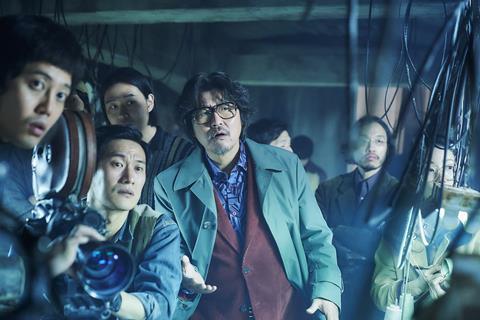Kim Jee-woon’s Cannes entry is an entertainingly affectionate ode to film-makers and film-making

Dir: Kim Jee-woon. South Korea. 2023. 135mins
In Cobweb, Kim Jee-woon satirises the egos and insecurities of those who work in front of and behind the camera, delivering a delightfully silly portrait of the filmmaking process. This affectionate hoot hardly breaks new ground with its film-within-a-film structure, but the South Korean auteur attacks the material with such good cheer, populating the story with a collection of daffy dreamers, that it’s easy to root for these characters as they reshoot the ending of a picture some of them are convinced is this close to being a masterpiece. Kim’s longtime collaborator Song Kang-ho charms as a director hoping to be at the precipice of a career comeback — the audience knows better, but it’s endlessly amusing to watch him try to achieve his vision.
A delightfully silly portrait of the filmmaking process
This is Kim’s third picture to screen in Cannes, where it is being spotlighted in an out-of-competition slot. Filled with laughs, and featuring several Kim regulars, including Lim Soo-jung and Jeon Yeo-been, Cobweb heads to the Sydney Film Festival in June and will be welcomed by cinephiles — especially those who enjoy comedies that lampoon the foibles of deeply flawed creative types.
It’s the early 1970s, and Director Kim (Song) is a once-promising filmmaker whose first feature was garlanded but has since gone on to produce trashy genre pictures. Determined to prove his artistic bona fides, he has just wrapped production on Cobweb, but once he finishes the shoot, he hits upon a better finale that he is sure will guarantee the film critical acclaim. Gathering his cast — including womanising married actor Ho-se (Oh Jung-se) and Yu-rim (Jung Soo-jung) — Director Kim reshoots the ending while keeping the censorship board off his back and dealing with other behind-the-scenes drama.
Working from a screenplay by Shin Yeon-shick, Kim pays tribute to an era in South Korean cinema when directors had to navigate repressive censorship rules while trying to express themselves creatively. That admiration flows through Cobweb, which explains why, although Song’s Director Kim seems to be making another fiasco, the film is never snide about its characters’ aspirations. Cobweb has abundant sympathy for the fact that the reach of artists often exceeds their grasp, and what’s ultimately touching about this comedy is Director Kim’s faith in his new ending. His cast may be puzzled by the new scenes — one of his actors actively questions whether the whole thing isn’t just overblown and corny — but Director Kim won’t give up, even if viewers are not exactly sure what he’s trying to achieve.
Indeed, Kim keeps us in the dark about the picture that Director Kim is making, and part of Cobweb’s fun comes from trying to deduce what precisely is going on. The film-within-the-film is clearly heavily melodramatic and involves a love triangle, but the random sequences we see are sometimes laughably histrionic. (Lim excels as a veteran actress who was part of Director Kim’s first triumph but is now reduced to screaming his hyperbolic lines in this new production.) Decision To Leave cinematographer Kim Ji-yong shoots Director Kim’s film in noir-ish black and white, while the 1970s real world is presented in nostalgically faded colours, aided by Choi Eui-young’s sharp period costume design.
As would be expected, everything that can go wrong will go wrong as Kim juggles this fictional auteur’s many headaches. If it’s not the nitpicking censors, it’s the fact that Yu-rim’s secret pregnancy has left her feeling ill and unable to film. Luckily, Director Kim is assisted ably by Mido (Jeon Yeo-been), the heiress to the production company backing this project — she’s an ace right-hand woman who can take on any problem and, more importantly, shares Director Kim’s certainty that they’re a new ending away from a landmark motion picture. Jeon radiates the same sweet, crazy idealism as Song, and their rapport ensures that Cobweb has an emotional anchor amidst all the zany gags and artistic meltdowns.
Because this is well-worn comedic terrain, Cobweb’s two-hour-plus runtime can be excessive. That’s especially true during an extended epilogue that reiterates the picture’s central themes without adding much new insight. But in a sign of Kim’s obvious identification with his protagonist, he lets Director Kim get a happy ending, one that suggests how even those who are creatively stagnant can sometimes land on a beautiful idea. Song plays this man as foolish but also committed — to his vision for his film, but also to the idea that taking risks in the name of art is a worthwhile endeavour. As funny as Cobweb is, that very sincere idea is at its core.
Production company: Anthology Studios
International sales: Barunson E&A, intl@barunsonena.com
Producer: Choi Jae-won
Screenplay: Shin Yeon-shick
Cinematography: Kim Ji-yong
Production design: Jeong Yi-jin
Editing: Yang Jin-mo
Music: Mowg
Main cast: Song Kang-ho, Lim Soo-jung, Oh Jung-se, Jeon Yeo-been, Jung Soo-jung, Park Jung-soo, Jang Young-nam















![[L-R]: Amanda Villavieja, Laia Casanovas, Yasmina Praderas](https://d1nslcd7m2225b.cloudfront.net/Pictures/274x183/6/4/1/1471641_pxl_20251224_103354743_618426_crop.jpg)









No comments yet